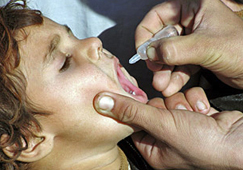New vaccines are saving South Africa's children's lives
6 May 2015
Health Minister Dr Aaron Motsoaledi says the South African government needs to change
its budget strategy to strengthen the public health system if the country, along with
other African states, is to take the continent forward.
Delivering his budget speech to Parliament on Tuesday, the minister said the strategy
would also prioritise the prevention of disease and promotion of health to ensure that
people get good quality health care.
Motsoaledi said the need for stronger public health systems was crucial if outbreaks of
diseases such as ebola, meningitis, tuberculosis, HIV and Aids, and polio were to be
prevented and managed.
A recent WHO conference recommended that instead of vertical programmes, or
separate budgets, to fight diseases, governments should instead invest in strengthening
public health systems.
"We believe that what will help Africa are strong health systems which, in turn, will
withstand
whatever outbreak emerges because … we actually do not know what
will follow next.
The Minister said that in the 2014/15 financial year, his department had been putting in
place plans to strengthen the public health system.
"This will include preventing disease, promoting health and making sure that our people
get good quality health care. This is our mandate and this we shall pursue with vigour.
This does not mean vertical programmes are to be abandoned. It simply means that
strengthening health care systems will be our flagship while vertical programmes will be
supportive," he said.
Prevention is better than cure
Motsoaledi said that while curing diseases was usually regarded as a scientific
achievement, prevention was not given the same stature.
He said this was the reason why in the public health sector, any negative event that
happened was immediately regarded as a collapse of the health system.
"No matter what
detractors will say, we shall not abandon or weaken the preventative
aspect of the health system. On the contrary, it is going to be the foundation of our
programme of health system strengthening," he said.
To pursue the goal of prevention, the department of health introduced new vaccines in
2009 in its routine immunisation programme, including the Pneumococcal conjugate
vaccine and the rotavirus vaccine.
"Pneumococcal diseases include very dangerous diseases like meningitis and severe
pneumonia. These are the leading causes of death of children five years and under
globally. In South Africa, pneumococcal disease comes only second to HIV and AIDS in
causing deaths of under fives," he said.
The impact of the new vaccines have been monitored by the National Institute of
Communicable Diseases (NICD), which reports that the incidence of invasive
pneumococcal disease in children under the age of five had decreased by 70% since the
introduction of
the vaccines. The number of children under the age of two admitted to
hospital with rotavirus-caused diarrhoea had decreased by 66%.
The government had budgeted R450-million a year for pneumococcal vaccines and
R200-million a year for a vaccine offering protection against rotavirus. This, together
with better programmes for the treatment of HIV/AIDS, had contributed to a significant
improvement in South Africa's childhood mortality rate, Motsoaledi said.
SAinfo reporter and SAnews.gov
 South Africa conducts immunisation campaigns against a number of childhood diseases (Photo: World Health Organisation)
South Africa conducts immunisation campaigns against a number of childhood diseases (Photo: World Health Organisation)




